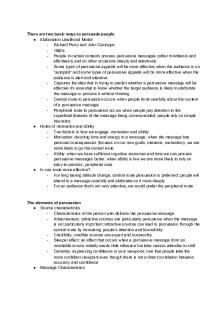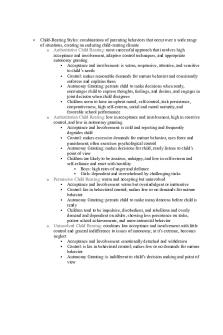Psychology Chapter 8 Notes PDF

| Title | Psychology Chapter 8 Notes |
|---|---|
| Course | General Psychology |
| Institution | Dawson College |
| Pages | 6 |
| File Size | 93 KB |
| File Type | |
| Total Downloads | 43 |
| Total Views | 169 |
Summary
Profesor Rajesh Malik...
Description
Chapter 8 - Intelligence TEST 3
Intelligence Intelligence: One’s ability to solve problems, adapt to environment, and learn from experience Relates to broad array of psychological factors, including memory, leaning, perceptions and language Often defined by variable being measured
Theories of Intelligence General Intelligence (g factor): Spearin speculated that humans have a singular underlying aptitude or intellectual ability
Gardner’s Multiple Intelligences Intelligence consists of multiple abilities that come in different packages Gardner identified eight relatively independent intelligences Saw evidence of multiple intelligence in people with savant syndrome
-
Gardner’s Eight Intelligences Linguistic
.1
Logical Mathematical Musical
.3
Spatial
.4
.2
( Bodily Kinaesthetic (Dancers, athletes
.5
Interpersonal: The ability to understand emotions of others
.6
Intrapersonal: Ability to understand yourself and control and regulate your emotions Naturalist: Ability for you to see small details and separate objects that exist in nature
.7
.8
Sternberg’s Three Intelligences Analytical: Ability to analyze situations and problems Practical: Solving day to day problems as they arrive Creative: Coming up with new inventions, new ideas
Criticisms of Multiple Intelligence Theories Research has confirmed the existence of a general intelligence factor that predicts performance on various complex tasks and in various jobs
•
Found using factor analysis • Ingredients for success - ability and motivation
•
Researchers report a 10-year rule • Expert performers spend about a decade in intense and daily practice
•
Emotional Intelligence Perceiving Emotions
-
Understanding Emotions Managing Emotions Using Emotions
-
-
-
Emotional intelligence : Emotionally intelligent people • Are socially aware and self-aware
-
Read other’s emotions and provide appropriate feedback Delay gratification in favour of long-term rewards Are emotionally happy and physically healthy
-
-
-
Are often successful in career, marriage and parenting situations where academically smarter people fail
-
Intelligence Test Assesses an individual’s mental aptitudes and compares them with those of others, using numerical scores ( Aptitude test: Designed to predict a person’s future performance (IQ test Aptitude: Capacity to learn Achievement Test: Designed to assess what a person has learned
History of IQ tests Alfred Binet: Predicting School Achievement Assumed that all children follow the same course of intellectual development but not at the same rate Measured each child's mental age
-
-
Tested reasoning and problem-solving questions
-
(Intelligence Quotient (IQ Created by William Stern IQ: (Mental Age / Chronological Age) X 100 No longer computed The test-taker is assigned a score that represents his/her performance relative to the average performance
Lewis Terman: Measuring Innate Intelligence Adapted Binet’s tests for California schoolchildren • Established new standards for various ages • Extended upper end of test’s range • Named this revision the Stanford-Binet •
(Wechsler Adult Intelligence Scale (WAIS Created by David Wechsler •
-
•
( Contains verbal and performance (nonverbal subtests • Preschool and school-age child versions exist
•
Yields an overall intelligence score and separate scores for verbal • comprehensions, perceptual organization, working memory and processing speed
Three Tests of A good test Standardization: To separate things, the test has to be given under specific context and specific instructions to follow Reliability
-
Validity: A test should be measuring what it claims to be measuring
-
High and Low Scorers of Intelligence Tests Validity and significance of any test can be assessed by comparing people who score at the two extremes of the normal curve Low Extreme: Score below 70 A person could have an intellectual disability resulting from a known...
Similar Free PDFs

Psychology Chapter 8 Notes
- 6 Pages

Social psychology chapter 8
- 6 Pages

Psychology Chapter 8 homework
- 3 Pages

Psychology Chapter 9 Notes
- 14 Pages

Psychology Chapter 3 Notes
- 4 Pages

Psychology Chapter 4 Notes
- 6 Pages

Psychology notes - chapter 1
- 2 Pages

Chapter 16 Psychology Notes
- 18 Pages
Popular Institutions
- Tinajero National High School - Annex
- Politeknik Caltex Riau
- Yokohama City University
- SGT University
- University of Al-Qadisiyah
- Divine Word College of Vigan
- Techniek College Rotterdam
- Universidade de Santiago
- Universiti Teknologi MARA Cawangan Johor Kampus Pasir Gudang
- Poltekkes Kemenkes Yogyakarta
- Baguio City National High School
- Colegio san marcos
- preparatoria uno
- Centro de Bachillerato Tecnológico Industrial y de Servicios No. 107
- Dalian Maritime University
- Quang Trung Secondary School
- Colegio Tecnológico en Informática
- Corporación Regional de Educación Superior
- Grupo CEDVA
- Dar Al Uloom University
- Centro de Estudios Preuniversitarios de la Universidad Nacional de Ingeniería
- 上智大学
- Aakash International School, Nuna Majara
- San Felipe Neri Catholic School
- Kang Chiao International School - New Taipei City
- Misamis Occidental National High School
- Institución Educativa Escuela Normal Juan Ladrilleros
- Kolehiyo ng Pantukan
- Batanes State College
- Instituto Continental
- Sekolah Menengah Kejuruan Kesehatan Kaltara (Tarakan)
- Colegio de La Inmaculada Concepcion - Cebu







